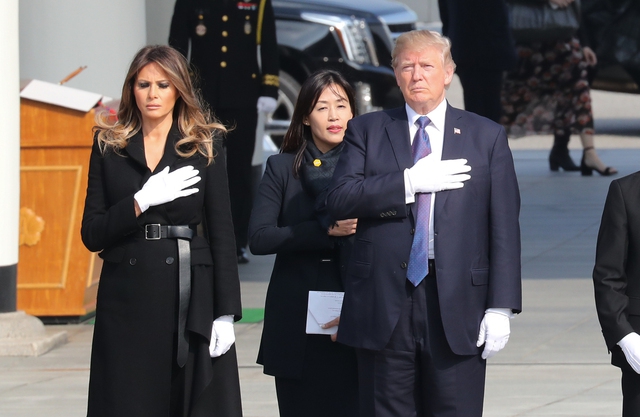 |
|
US President Donald Trump and his wife Melanie pay their respects at the National Cemetery in the Dongjak District of Seoul on Nov. 8. (Photo Pool)
|
Billions of dollars in transactions will lessen the trade deficit between the two sides
“In general, there were a lot of investment plans, as well as quite a lot of US product purchases. South Korean companies also shared solutions for problem areas such as various regulations related to local investment.” At 7 am on Nov. 8, the final day of US President Donald Trump’s visit to South Korea, senior figures from the White House and executives from South Korean conglomerates gathered at the Lotte Hotel in Seoul to discuss investment plans and purchases. Representing the US at the meeting were a number of economic and security aides, including Everett Eissenstat, Deputy Director of the White House National Economic Council (NEC); Susan Thornton, Acting Assistant Secretary of State in the Bureau of East Asian and Pacific Affairs; and Dina Powell, Deputy National Security Advisor. The South Koreans in attendance were executives from about 10 conglomerates (including the SK and Hanwha groups) with plans to invest in the US or to purchase its shale gas. The meeting was organized urgently and held behind closed doors, and the US reportedly requested that the matters discussed therein not be released to the public. The participating companies reportedly disclosed their specific plans for local investment and product purchases, while the American participants wrote down the corresponding amounts and schedules. This represented a sort of “memorandum of understanding” in which the participating parties commit to implement the terms that will be eventually included in the official contract. A survey conducted before Trump’s visit by the Korea Chamber of Commerce and Industry (KCCI) found that 42 companies are planning a total of US$17.3 billion worth of investment in the US and 24 companies are planning to purchase US$57.5 billion worth of US products (including US$22.8 billion in energy) over the next five years. “In addition to the investment and purchase plans identified in the survey carried out at the time of the South Korea-US summit held at the end of June, this included plans that are news and whose implementation schedules have been moved forward,” the KCCI said. While Trump defied expectations by deliberately avoiding “sensitive” topics and by exercising restraint in the language he used on the topic of trade during his visit to South Korea, he is thought to have gotten major results by sealing the deal on purchases not only of weapons but also of shale gas and liquefied natural gas (LNG), adding up to billions of dollars. The business community was represented at the state dinner held at the Blue House on the evening of Nov. 7, with executives from Samsung, Hyundai Motor Company, Hanwha, Poongsan, SK and Hanjin in attendance. “I noticed that a lot of companies from the defense industry [Hanwha, Hanjin and Poongsan, among others] were present, maybe because of the connection with weapons purchases. Since both sides had agreed to launch negotiations to revise the KORUS FTA, they seem to have strategically refrained from mentioning that issue,” said a source at one conglomerate. Instead, Trump basically decamped after receiving assurances on purchases of weapons and energy that can immediately reduce the trade deficit and on investment in the US that can simultaneously create American jobs while reducing the trade deficit. South Korean Trade Minister Kim Hyun-chong and US Trade Representative Robert Lighthizer were supposed to meet on the sidelines of the South Korea-US summit, but their meeting did not materialize. “We tried to find an appropriate time to hold a meeting for the trade officials, but we couldn’t find an opportunity because of delays in President Trump’s itinerary,” said a senior official in the South Korean government. In connection with this, some analysts believe that the US adopted the strategy of closing the deal on investment and purchases – which result in an immediate cash flow – because it regards the FTA negotiations as an uncertain “promissory note” whose future benefits are uncertain, even if the agreement is revised in favor of the US. By Cho Kye-wan, staff reporter Please direct questions or comments to [english@hani.co.kr]






